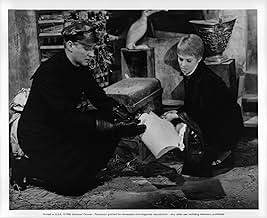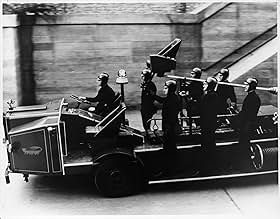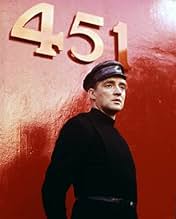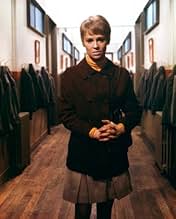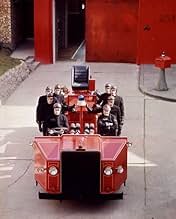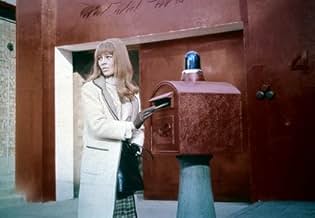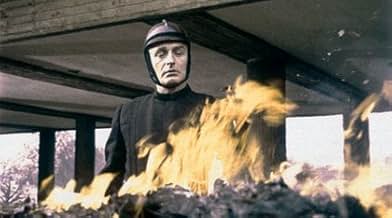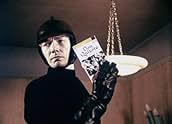Fahrenheit 451
- 1966
- Tous publics
- 1h 52min
NOTE IMDb
7,2/10
47 k
MA NOTE
Dans un avenir oppressif, un pompier dont le travail consiste à détruire tous les livres se met à s'interroger sur sa tâche.Dans un avenir oppressif, un pompier dont le travail consiste à détruire tous les livres se met à s'interroger sur sa tâche.Dans un avenir oppressif, un pompier dont le travail consiste à détruire tous les livres se met à s'interroger sur sa tâche.
- Réalisation
- Scénario
- Casting principal
- Nomination aux 1 BAFTA Award
- 1 victoire et 4 nominations au total
Gillian Aldam
- Judoka Woman
- (non crédité)
Alfie Bass
- Book Person: 'The Prince'
- (non crédité)
Yvonne Blake
- Book Person: 'The Jewish Question'
- (non crédité)
Arthur Cox
- Male Nurse
- (non crédité)
Frank Cox
- Book Person: 'Prejudice'
- (non crédité)
Fred Cox
- Book Person: 'Pride'
- (non crédité)
Noel Davis
- Cousin Midge - TV Personality
- (non crédité)
Judith Drinan
- Book Person - Plato's 'Republic'
- (non crédité)
Kevin Eldon
- Robert - First Schoolboy
- (non crédité)
Avis à la une
Perhaps one of the greatest science fiction writers of all time is Ray Bradbury. He was able to look at so many different fantastical things from so many different fantastical angles. Many credit his novel Fahrenheit 451 has his greatest work. It is a book that depicts a future where learning is oppressed and conformity is expected. Government rules with no one ever questioning it. The masses are swayed by what the government wants them to see through television and pills. This adaptation of Bradbury's novel by French auteur Francois Truffault is effective in retaining the heart of Bradbury's work. Oskar Werner plays Guy Montag, a fireman who burns books rather than puts fires out. He is an expert in his field. He can find all the neat, out-of-the-way places people hide their books like in toasters or behind TV picture tubes. Books are outlawed as seen as corrupting forces in society. Only picture books are allowed. Montag goes on with his mundane life with his wife who is always watching television. The status of one is determined by how many TVs you have in the house. Montag doesn't like TV and has an undeniable quench for something more. Anyway, he meets a neighbor like him in spirit and soon decides to start reading. I loved this film because its message is so very clear today and so scary as we live in a society very different from Montag's yet not so far away. TV dominates our lives to some degree. Most of our news comes from it. Much of our bias comes from it. It is definitely a defining instrument in our lives whether or not we wish to admit it. Reading some argue is in a massive decline and our standards as a society certainly have much lower expectations as to what people should know. If you doubt this, just look at a show from the 1960s(even a show like Bewitched or Gilligan's Island) and compare the vocabulary to something made for a similarly aged viewing audience. We dumb down everything. Anyway enough sermonizing, Farenheit 451 will get your mind thinking. Truffault creates plenty of suspense and a wonderfully eerie new future. His use of color in particular really impressed me. It is of course the 60s, but he makes his world look very different. The acting is very good. Werner gives a more than competent performance as a man troubled with a life he finds to be false. Julie Christie excels playing BOTH Werner's wife and the neighbor girl that inspires him to find the true self. I also enjoyed a rare turn by crusty Cyril Cusak! This is indeed an underrated science fiction film and more importantly a film that should be explored as we move closer and closer to that society it showcases. Fortunately for all of us here, we understand the power, the joy, the fulfillment that reading and writing bring us each day. One last note(or two): this was Truffault's first film in English(may be his only one?) and the ending was wonderfully done!
From Ray Bradbury's novel about totalitarian society that has banned books and printed words in order to eliminate independent thought; Oskar Werner plays professional book-burner who becomes enraptured with stories. Possibly a bit too thin at this length, but a fascinating peek at a cold future (which the times have just about caught up to). Didn't get a warm reception from critics in its day, yet the performances by Werner and Julie Christie (in a dual role as both Werner's wife and a rebel acquaintance) are top notch. I was never a fan of director François Truffaut's too-precious stories of childhood, but this film, curiously his only English-language picture, is extremely well-directed; the sequence with the woman and her books afire is one amazing set-piece, with tight editing, incredible and precise art direction, and the camera in all the right places. Truffaut lets you feel the agony of book paper curling up black in a mass of orange flames, and the proud defiance of the woman as she herself strikes the match. Unforgettable. *** from ****
A film about the deliberate dumbing down and control of the populace using information control is perhaps more relevant than ever but Fahrenheit 451 also shows it's age in many parts and the conclusion doesn't feel right to my sensibilities.
Even so it's a story worth knowing and still an effective - though at times glacially paced - film.
The acting is passable. It follows the rather stilted form common at the time but it still conveys the story well and since the characters are supposed to be emotionless and controlled it's also fairly effective.
All in all I would recommend anyone to see it. It's not as impactful as 1984 but still a classic story that should be remembered.
Even so it's a story worth knowing and still an effective - though at times glacially paced - film.
The acting is passable. It follows the rather stilted form common at the time but it still conveys the story well and since the characters are supposed to be emotionless and controlled it's also fairly effective.
All in all I would recommend anyone to see it. It's not as impactful as 1984 but still a classic story that should be remembered.
Go figure that I had the privilege of seeing "Fahrenheit 451," for free, on a big screen a few years back (an independent Illinois art house had gotten hold of what was allegedly one of the last surviving prints), and at the time hadn't the foggiest concept of how PRIVILEGED an event it was. Sitting in a theater crowded with college students on a budget with nothing better to do, I watched this diverting little retro item, appreciated its subtlety, nuance, bold visual style, and 'got' the message that if we're not careful, we'll be mindless drones having our desires dictated by The Tube (in current times, that's hardly a profound statement).
Francois Truffaut's adaptation of Ray Bradbury's novel is a bold visual feast that presents a time that might seem 'retrograde' in the eye of a modern pop-culture snob, but ultimately projects what a conceivable 'future' might look like (and not that CGI malarkey served up in "The Matrix"). Interiors of houses are awash in odd colors and give shelter to appliances that don't look dissimilar from our own; TV screens embedded in living-room walls play programs which vacuous housewives interact with sometimes. The film is so relentlessly confident in its appearance that it withstands the test of time.
Though if "Fahrenheit 451" only had its storybook style to rely on, it would fade and be filed away as a mere technical achievement. Truffaut, working from strong source material, concocts a riveting parable about ignorance and the things we, as humans, take for granted. The story follows Guy Montag, an Everyman who is employed as a fireman--a connotation which entails ransacking residences in search of books (reading and writing have been outlawed in this world) and burning them. He has a medicated-smile wife (Julie Christie), a quiet home life, and is in line for a promotion, until a neighbor (Christie again) inspires him to question his motives for working such a sordid job.
One character argues that books cause depression, making people confront unpleasant feelings. "Fahrenheit 451" sometimes runs the risk of lending truth to that statement--in some ways, it is a bleak commentary on civilization, but at the same time grounded in a benevolent humanity that offsets Orwell's brutal, pessimistic world of "1984" (though both texts and films share similar themes). This humanity is underlined in an upbeat, even comic ending (the details of which I won't divulge here).
"Fahrenheit 451" is a spellbinding work of art, in good company with other incendiary works ("A Clockwork Orange" and "Fight Club" come to mind) that have defied the constraints of time and age.
Francois Truffaut's adaptation of Ray Bradbury's novel is a bold visual feast that presents a time that might seem 'retrograde' in the eye of a modern pop-culture snob, but ultimately projects what a conceivable 'future' might look like (and not that CGI malarkey served up in "The Matrix"). Interiors of houses are awash in odd colors and give shelter to appliances that don't look dissimilar from our own; TV screens embedded in living-room walls play programs which vacuous housewives interact with sometimes. The film is so relentlessly confident in its appearance that it withstands the test of time.
Though if "Fahrenheit 451" only had its storybook style to rely on, it would fade and be filed away as a mere technical achievement. Truffaut, working from strong source material, concocts a riveting parable about ignorance and the things we, as humans, take for granted. The story follows Guy Montag, an Everyman who is employed as a fireman--a connotation which entails ransacking residences in search of books (reading and writing have been outlawed in this world) and burning them. He has a medicated-smile wife (Julie Christie), a quiet home life, and is in line for a promotion, until a neighbor (Christie again) inspires him to question his motives for working such a sordid job.
One character argues that books cause depression, making people confront unpleasant feelings. "Fahrenheit 451" sometimes runs the risk of lending truth to that statement--in some ways, it is a bleak commentary on civilization, but at the same time grounded in a benevolent humanity that offsets Orwell's brutal, pessimistic world of "1984" (though both texts and films share similar themes). This humanity is underlined in an upbeat, even comic ending (the details of which I won't divulge here).
"Fahrenheit 451" is a spellbinding work of art, in good company with other incendiary works ("A Clockwork Orange" and "Fight Club" come to mind) that have defied the constraints of time and age.
The Firemen take the knowledge, they won't permit, those with power make the rules, it's their remit, books are burned and turned to ash, as sparking kerosene arcs flash, if you're caught with contraband, they will commit. Montag works the fire, erasing texts, since meeting Clarisse he's increasingly perplexed, she's opened up a door, that's taken him to hidden floors, now he knows the flames he throws are all pretext.
It's not the greatest piece of filmmaking you've ever seen, and you can pull a wagon through some of the holes in the logic, but for its time, and as an example of how the few can control the many, it's still worth an exploration to benchmark where the world is all these years later.
It's not the greatest piece of filmmaking you've ever seen, and you can pull a wagon through some of the holes in the logic, but for its time, and as an example of how the few can control the many, it's still worth an exploration to benchmark where the world is all these years later.
Le saviez-vous
- AnecdotesThe film's credits are spoken, not read, in keeping with the film's theme of destruction of reading material.
- GaffesAfter Montag comes out of the first raid to burn the books, the placement of the fire protective clothing (helmet and gloves) are unnatural movements and appear to be a reverse run of film footage. This is further compounded by the fact that he walks backwards to get the flamethrower which has flame entering the nozzle instead of leaving the nozzle.
- Citations
Guy Montag: To learn how to find, one must first learn how to hide.
- Crédits fousThe beginning credits are spoken instead of written on the screen.
- Versions alternativesOriginally Noel Davis (who plays Cousin Midge) did the opening voice over. In the current version it is done by Alex Scott ("The Life of Henry Brulard" Book Person).
- ConnexionsFeatured in Night Gallery: The Different Ones/Tell David.../Logoda's Heads (1971)
Meilleurs choix
Connectez-vous pour évaluer et suivre la liste de favoris afin de recevoir des recommandations personnalisées
- How long is Fahrenheit 451?Alimenté par Alexa
Détails
- Date de sortie
- Pays d’origine
- Sites officiels
- Langues
- Aussi connu sous le nom de
- Farenhajt 451
- Lieux de tournage
- Châteauneuf-sur-Loire, Loiret, France(Monorail)
- Sociétés de production
- Voir plus de crédits d'entreprise sur IMDbPro
Box-office
- Budget
- 1 500 000 $US (estimé)
- Montant brut aux États-Unis et au Canada
- 509 $US
- Week-end de sortie aux États-Unis et au Canada
- 11 206 $US
- 25 avr. 1999
- Montant brut mondial
- 581 $US
- Durée
- 1h 52min(112 min)
- Rapport de forme
- 1.66 : 1
Contribuer à cette page
Suggérer une modification ou ajouter du contenu manquant


